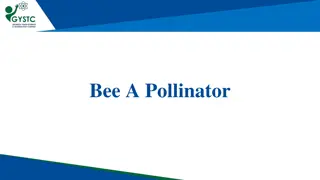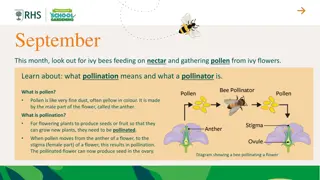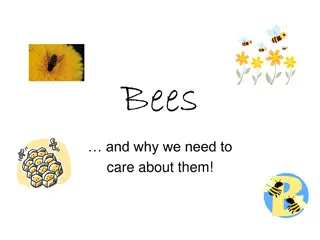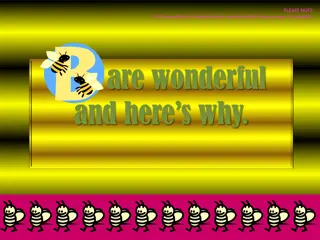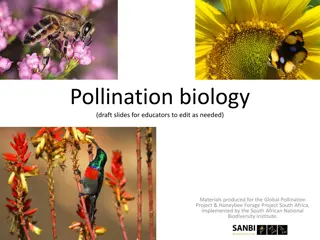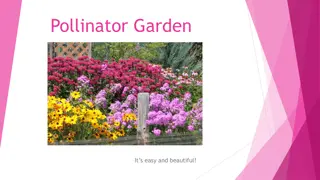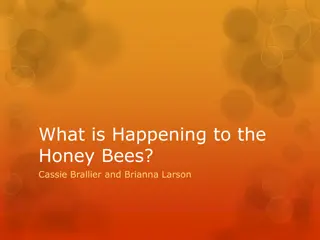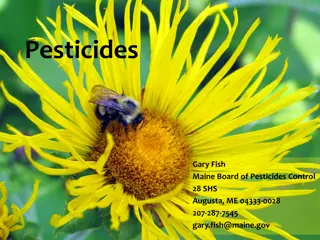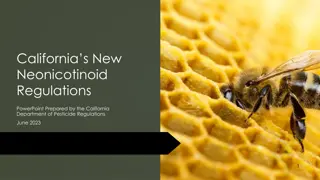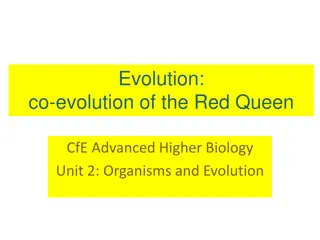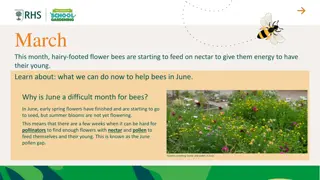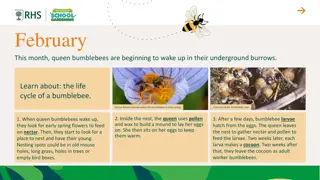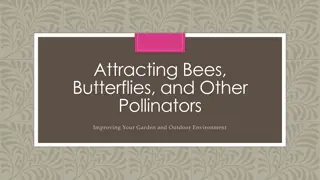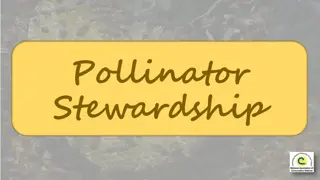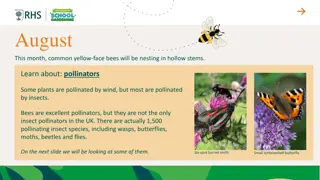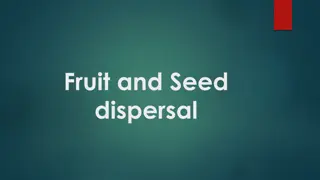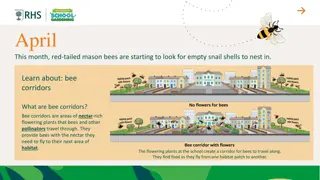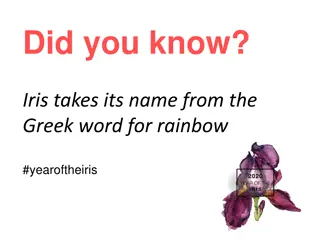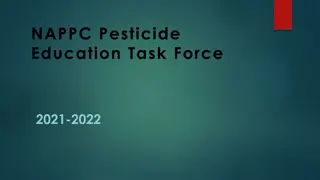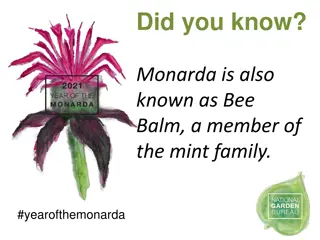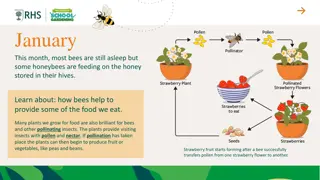Understanding the Importance of Bees as Pollinators in Ecosystems
Explore the vital role of bees in pollination through hands-on activities, educational videos, and discussions. Learn about the decline of honeybee populations and delve into innovative solutions like robotic pollinators. Engage in STEM challenges to redesign bee-like robots for effective pollinatio
3 views • 13 slides
Understanding Pollination: The Role of Pollinators in Plant Growth
In September, watch out for ivy bees feeding on nectar and gathering pollen from ivy flowers. Explore the significance of pollination, pollen, and pollinators in the plant life cycle. Discover how bees and other pollinators play a crucial role in food production and biodiversity. Engage in activitie
2 views • 9 slides
Importance of Bees: Why We Need to Care About Them
Bees are essential pollinators, with various species playing crucial roles in ecosystems. They forage for pollen and nectar, create honey, and live in diverse habitats. Bumble bees, honey bees, and solitary bees each have unique characteristics and contribute to biodiversity. However, bees face thre
6 views • 21 slides
The Buzz about Bees: Nature's Essential Pollinators
Bees play a crucial role in our ecosystem by pollinating plants and helping them multiply. There are various types of bees, each with unique characteristics. From the queen bee laying up to 2,000 eggs a day to the hive supporting up to 100,000 bees, these fascinating insects are vital for our enviro
0 views • 10 slides
Understanding Pollination Biology and the Importance of Honeybees
Pollination is a crucial process for plant reproduction, with both abiotic and biotic methods. Self- and cross-pollination play essential roles, relying on various agents like insects. Honeybees, vital pollinators, have a significant impact on food production and ecosystem balance, demonstrating the
0 views • 18 slides
Create a Pollinator Garden: Easy and Beautiful Tips
Design your own pollinator garden to attract butterflies, bees, and other pollinators with nectar and pollen sources. Learn about the benefits of native plants, planting strategies, and a variety of flowers to create a vibrant and thriving garden that supports biodiversity.
1 views • 7 slides
The Devastating Impact of Colony Collapse Disorder on Honey Bees
A profound look into the catastrophic effects of Colony Collapse Disorder (CCD) on honey bee populations, causing the loss of millions of beehives and threatening crop pollination. Scientists attribute CCD to a deadly mix of fungicides and pesticides found in pollen samples, disrupting bees' neurolo
0 views • 6 slides
Understanding Pesticide Use and Impact on Pollinators
Pesticides play a crucial role in agricultural production in areas like New Hampshire and Maine. However, their use raises concerns about potential hazards, especially for pollinators like bees. Different types of formulations and tank mixes carry varying risks to these essential insects. It is impo
0 views • 36 slides
New Regulations on Neonicotinoids in California: An Overview
The presentation by the California Department of Pesticide Regulations highlights the new regulations on neonicotinoids, systemic pesticides affecting insects' central nervous systems. It provides insights into the history of neonicotinoid use in California, the development of alternative pesticides
0 views • 19 slides
Understanding Co-evolution: A Closer Look at the Red Queen Hypothesis in Biology
Co-evolution refers to the reciprocal genetic changes in species in response to each other. The Red Queen Hypothesis, illustrated in the arms race between parasites and hosts, exemplifies this phenomenon. This interaction drives evolutionary dynamics in herbivores, plants, pollinators, prey, predato
0 views • 18 slides
Helping Bees in June: Bridging the Pollen Gap
In June, bees face challenges due to the pollen gap between spring and summer blooms. By sowing flowering plant seeds in March and letting grass patches grow with dandelions and daisies, we can provide vital nectar and pollen sources for bees to thrive. Engage your school community in planting activ
0 views • 8 slides
The Fascinating Lifecycle of Bumblebees in February
Queen bumblebees emerge in February, starting their cycle of building nests, laying eggs, and nurturing their young. Learn about their underground burrows, feeding habits, and the crucial role of early spring flowers. Discover how protective measures can ensure a safe environment for these vital pol
0 views • 10 slides
Enhancing Your Garden for Bees, Butterflies, and Pollinators
Enhance your outdoor space by attracting bees, butterflies, and other pollinators. Plant pollen-rich flowers, avoid harmful chemicals, provide food and water sources, and offer shelter for a thriving pollinator-friendly environment.
0 views • 5 slides
Celebrating Pollinator Stewardship Through Nature's Wonders
Amidst the beauty of creation, the Pollinator Stewardship Litany reflects on the intricate balance of life on Earth. Leaders and congregants join in praising the Lord for the abundance of creatures and the bountiful provisions provided. The significance of pollinators in sustaining life, particularl
0 views • 18 slides
Discovering Pollinating Insects in the UK
Learn about the diverse world of pollinating insects in the UK, including bees, moths, wasps, butterflies, beetles, and flies. Explore how these insects play a crucial role in pollination, benefiting plant ecosystems. Engage in a fun learning activity to spot different pollinators in the wild and un
0 views • 7 slides
Plant Reproduction: Pollination and Seed Dispersal Mechanisms
Explore the fascinating world of plant reproduction through pollination and seed dispersal mechanisms. Learn about the different types of pollination, such as self-pollination and cross-pollination, and the importance of fruit and seed dispersal. Discover how plants use various strategies to ensure
0 views • 6 slides
Creating Bee Corridors for Pollinator Conservation
Red-tailed mason bees are starting to nest in empty snail shells this month. Learn about bee corridors, areas of nectar-rich plants that help bees move between habitats. The need for bee corridors is highlighted as urbanization reduces natural habitats. Activities like creating bee corridors, allowi
0 views • 7 slides
Fascinating Facts About Irises - Year of the Iris
Irises, named after the Greek word for rainbow, are stunning flowers with unique characteristics. They feature three upward petals called standards and three downward sepals known as falls. The sepals act as landing pads for pollinators, guiding them towards nectar. Irises come in a variety of color
0 views • 9 slides
NAPPC Pesticide Education Task Force 2021-2022 Summary
The NAPPC Pesticide Education Task Force for 2021-2022 aims to utilize pesticide registration and regulation as tools to safeguard and enhance pollinator health. The task force focuses on educating various audiences, including pesticide applicators, farmers, homeowners, educators, and state departme
1 views • 15 slides
Year of the Monarda: Fascinating Facts About Bee Balm
Monarda, also known as Bee Balm, is a captivating plant that attracts pollinators like butterflies and hummingbirds. Native to North America, with common species like didyma, fistulosa, and punctate, it has been used by Native Americans for medicinal purposes. Its delightful flowers and leaves, addi
0 views • 8 slides
The Vital Role of Bees in Pollination for Food Production
Bees play a crucial role in pollination, helping to produce a variety of foods like fruits, vegetables, and herbs that end up on our plates. This process involves bees transferring pollen between plants, leading to the development of crops such as strawberries and peas. Without bees and other pollin
0 views • 9 slides
